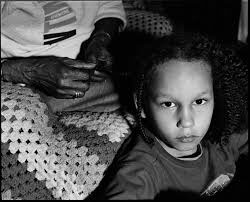Quotes from interview with David Campany
The new neo-liberal narrative for the “creative class” omits the conditions of the working class and refuses the perspective and creativity of a subject like myself
Yet, despite their harsh criticism they also felt that photography could liberate a new way of seeing and a radical consciousness. ‘The Notion of Family’ responds to that call to suspend the passive aestheticism that turns abject poverty into an object of enjoyment
It’s imperative we tell our own stories, controlling the framework, context and narrative
Select one image from the photographer and analyse in depth following this method: TECHNICAL, VISUAL, CONTEXTUAL, CONCEPTUAL – focus on the last two aspects of analysis to achieve highest marks

Frazier, who is very close to her grandmother and namesake Ruby often incorporates imagery of her grandmother in her subversion of traditional white social documentary photography she criticises the way white artists ostracise emergent working class photographers, she says, “The new neo-liberal narrative for the “creative class” omits the conditions of the working class and refuses the perspective and creativity of a subject like myself” This image, taken from La Toya Ruby Frazier’s photobook ‘The Notion of Family’ shows a young girl having her hair done by her grandmother who’s face is out of frame leaving to an anonymity of her identity. The photo is in black and white which gives off a dramatic, gritty ambiance elevated by the young girl looking directly into the camera, unsmiling. This could possibly be Frazier’s response to the medias interpretation of black women as aggressive and stripping black people of their identity’s as she explains in her interview with David Campany, “It’s imperative we tell our own stories, controlling the framework, context and narrative” This quote highlights the importance of storytelling in art through your ow perspective rather than what other want you to do. Frazier employs the use of leading lines of the old woman’s hands to place more emphasis on the young girl and make her gaze more powerful. This gaze is an inversion on society as customarily black people are the ones constantly scrutinised not the other way round. Frazier manages to make the photo beautiful despite it’s dark messaging. This could be purposefully done to represent how blackness is aestheticised by the media as she writes “Yet, despite their harsh criticism they also felt that photography could liberate a new way of seeing and a radical consciousness. ‘The Notion of Family’ responds to that call to suspend the passive aestheticism that turns abject poverty into an object of enjoyment” The photo resonates with many other pieces of Frazier’s work as it is heavily connected to the idea of family, specifically her grandmother.









